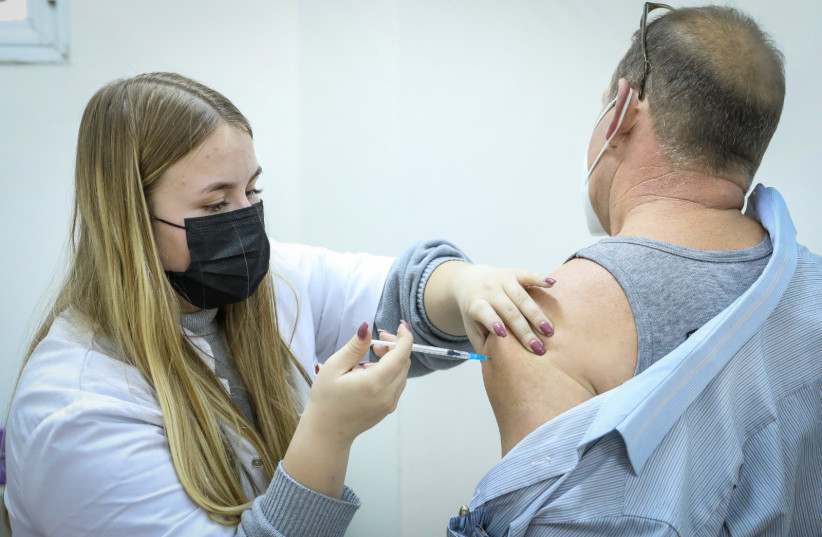Between two and four million Israelis are going to get infected with COVID, Prime Minister Naftali Bennett warned on Sunday, as the number of serious patients in Israel climbed to 205, 37 more than on the previous day and more than double the number recorded on the previous week.
“Omicron is not alpha or delta, it is contagious to an extent we did not know,” Bennett wrote in a post addressing the public on his Facebook page. “Information presented at the cabinet meeting indicates that in Israel, a total of 2-4 million citizens will be infected in the current wave.”
“This is a storm that is sweeping the world, including countries that have taken a general blockade,” he further said. “But, even within the storm, our goal remains the same - to keep the economy as open as possible, and to protect the most vulnerable - the elderly, the sick, anyone at high risk of developing a serious illness and getting hospitalized.”
The number of serious patients in Israel continued to surge on Sunday, as the country registered 205 such patients, 37 more than on the previous day and more than double the number recorded the previous week. In addition, active cases reached the all-time record of 115,000, with testing stations overcrowded and the Health Ministry’s hotline collapsing under the amount of calls.
“The Omicron wave is upon us and as you all are feeling it is very contagious,” Prime Minister Naftali Bennett said while opening the weekly government meeting, while the coronavirus cabinet was scheduled to convene later at night.
Bennett acknowledged the problems in access to tests.
“I can say – at the moment, immediately – that free kits will be supplied to pupils,” Bennett said. "Every child in Israel – in pre-schools and primary schools, as well as teaching staffs – will immediately receive three testing kits.”
The government has also been working to ensure that the kits are available in stores at an accessible price.
Shortly before the beginning of the cabinet, the Health Ministry announced that they would allow retail stores to sell the tests, with the goal of lowering the prices.
“Prices will drop in the near future anyway because the market will be flooded with millions of kits that will arrive in Israel,” Bennett vowed, adding that they are also negotiating with pharmacy chains to achieve the result.
Around a million and a half kits were also going to be distributed to old age homes, to keep the residents monitored.
Since Friday, the most accurate PCR tests – which need to be processed by a lab – have been reserved for people over 60 and at-risk groups. Individuals under 60 who are exposed to a verified case or present symptoms need to take an antigen, either at home or at one of the antigen testing stations (if they are not vaccinated, they must do the latter).
The new policy has been criticized, not only because of the high prices and the shortage of at-home tests, but also in light of the much lower accuracy of antigen tests in general.
“There is no doubt that antigen tests are less accurate than PCRs but in this situation, there is no choice,” Health Ministry Director-General Prof. Nachman Ash said in an interview with Radio FM103, referring to the high number of cases. “There are not enough PCRs and we need them for the elderly.”
On Saturday, Israel registered 17,521 new cases, slightly less than on Friday, when there were almost 19,000 but with fewer tests processed.
Over 11% of the 150,000 PCR tests returned a positive result. In addition, around 121,000 antigen tests were administered at testing stations, and 7,608 resulted positive.
The number of official active cases reached 115,000.
In the two years since the beginning of the pandemic, the country had never experienced such high figures.
In addition, in light of the new testing policy, a significant number of cases are understood to go undetected (experts believe that the real number of new virus carriers registered each day might soon hit 50,000 for a total of millions of infected within a few weeks).
In this situation, the crucial parameter monitored by the authorities has become the number of serious patients, to prevent the health system from getting excessively strained.
At the peak of the third wave in January and February last year, Israel had as many as 1,200 serious patients. During the Delta wave in the summer, the number remained between 700 and 800.
While Omicron so far appears to cause severe symptoms more rarely than previous variants, the explosion in infections still risks overcrowding the country’s hospitals, with experts foreseeing a number of serious patients between a few hundred and over 2,500.
Ash said that another reason of concern for the good functioning of hospitals is the high number of staff infected with the virus or in quarantine, a problem that could also be faced by other organizations critical for the country, such as the army.
“The way to deal with this issue is, first of all, keeping all the regulations strictly, keeping workers separated, working from home as much as possible, and so on,” he noted. “We are also examining whether it is possible to take specific measures in the field quarantine, to shorten it.”
Currently, the minimum time for isolation for those found positive is ten days.
While most of the serious patients continued to be non-vaccinated or vaccinated more than six months earlier – even more so considering that the vast majority of eligible Israelis are fully inoculated – the number of fully jabbed serious patients has been increasing in the past few days.
As of Sunday, of the 205 serious patients, 98 were not vaccinated, 22 were vaccinated over six months earlier and 77 were fully vaccinated.
Fully vaccinated people also represented 47% of new cases in the previous week.
In order to strengthen the protection of individuals over 60, the most vulnerable population, Israel has been conducting a vaccination drive offering them the fourth dose.
Around 250,000 Israelis had received it as of Sunday morning. Ash said that while it is true that he as well as many experts expected a higher increase in antibodies in the first days after the vaccine – preliminary results from research from the Sheba Medical Center has shown that the antibodies only increased five-fold, similar to the level recorded right after the third shot but not higher – he still believed that those inoculated with the new booster will result more protected, especially from serious symptoms.
“I am aware that the situation is not easy,” said Bennett.
“Despite our preparations, the beginning of every wave is difficult and cumbersome, how much more so in a wave of mass infection such as Omicron,” he further said. “We are prepared with drugs, hospital beds, vaccines that are accessible to children, protection for the senior population and the fourth dose of the vaccine, and we are currently seeing to tests as well."
On Sunday, Israel received the first shipment of Molnupiravir pills manufactured by Merck, after Pfizer’s Paxlovid pills arrived last week. Both treatments are intended to be administered to at-risk patients as soon as possible after infection to prevent them from developing serious symptoms and especially hospitalization and death.
"We will find the balance between a functioning economy and management of the crisis. This wave will not last forever," Bennett concluded. "There will be several tough weeks but we will get through them together."

